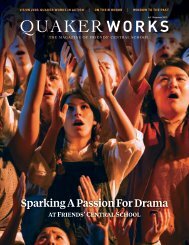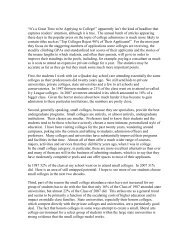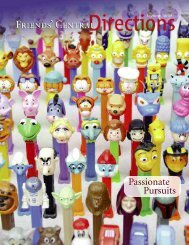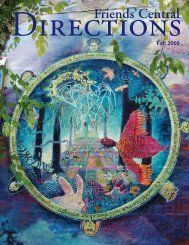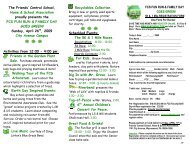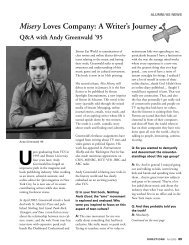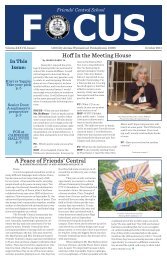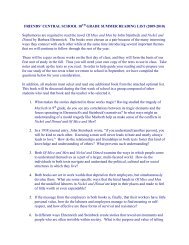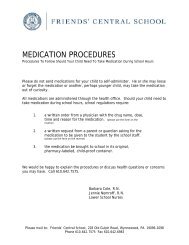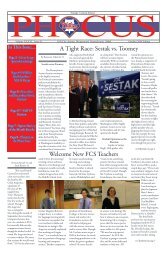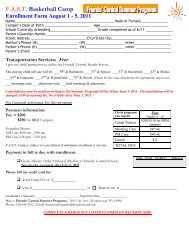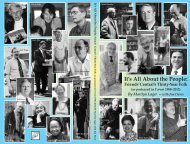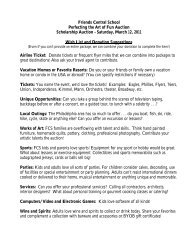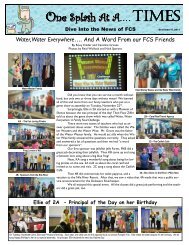2006-2007 Fall/Winter Directions - Friends' Central School
2006-2007 Fall/Winter Directions - Friends' Central School
2006-2007 Fall/Winter Directions - Friends' Central School
Create successful ePaper yourself
Turn your PDF publications into a flip-book with our unique Google optimized e-Paper software.
CAMPUS LOG – MIDDLE SCHOOL<br />
A.C.E.—At Your Service<br />
As of this fall, Friends’ <strong>Central</strong><br />
Middle <strong>School</strong> students have an<br />
extra resource at their disposal—<br />
the Academic Center for<br />
Excellence, or A.C.E. as it is more<br />
commonly known. The idea for A.C.E.<br />
and its corresponding website grew out of Deb<br />
(Peltz) Fedder’s ’79 desire to reach more students<br />
than her work as a language skills<br />
teacher allowed. Since 1993, Fedder has taught<br />
a language skills class to the approximately<br />
thirty seventh and eighth grade students who<br />
choose the course rather than begin a foreign<br />
language. But unfortunately, because of its<br />
focus on skills, the course has been viewed as<br />
remedial, even though no one, Fedder<br />
explains, ever grows beyond the need for attention<br />
to skills.<br />
Fedder, who holds a master’s degree in<br />
administration and social planning from<br />
Harvard Graduate <strong>School</strong> of Education, has<br />
always been interested in how kids learn, and<br />
she is thrilled about the way our society has<br />
developed a comprehensive and compassionate<br />
understanding of the variety of learning styles.<br />
One thing, however, has become increasingly<br />
clear to her—no matter what type of learner<br />
you are, basic skills such as time management,<br />
note-taking, organized research, or test-taking,<br />
just to name a few, profoundly influence academic<br />
success. Different learners may acquire<br />
and deploy these skills in different ways, but<br />
everybody needs them. What’s more, everybody<br />
needs to review them, again and again.<br />
An important moment in the creation of<br />
A.C.E. came when Fedder came across a site<br />
sponsored by Dartmouth College called the Academic Skills<br />
Center that offered exactly the type of reinforcement and support<br />
that she was offering through language skills to a student body<br />
that seemingly had already achieved a high level of academic success.<br />
Fedder visited Dartmouth last year and met with the<br />
Director of the Academic Skills Center. This visit corroborated<br />
her own sense that learning and teaching are a team effort and<br />
that kids of all levels and all competencies, even Ivy League students,<br />
can never get enough of this type of skill-based support<br />
and reinforcement.<br />
24 DIRECTIONS <strong>Fall</strong> <strong>2006</strong> / <strong>Winter</strong> <strong>2007</strong><br />
Deb Fedder ’79 working with Munir Abdus Shakur ’12 in A.C.E.<br />
“In no small part,” Fedder explains, “academic success<br />
depends on how resourceful students can be about doing what<br />
they are responsible for doing.” But most courses are content<br />
driven. Teachers everywhere design syllabi around texts and the<br />
ideas or concepts they want to tackle, and there isn’t always<br />
enough time to identify and then teach all of the skills the students<br />
need in order to master that curriculum. Enter A.C.E.—a<br />
multi-purpose room for students and teachers alike that sets out<br />
to erase the stigma attached to working on skills.



